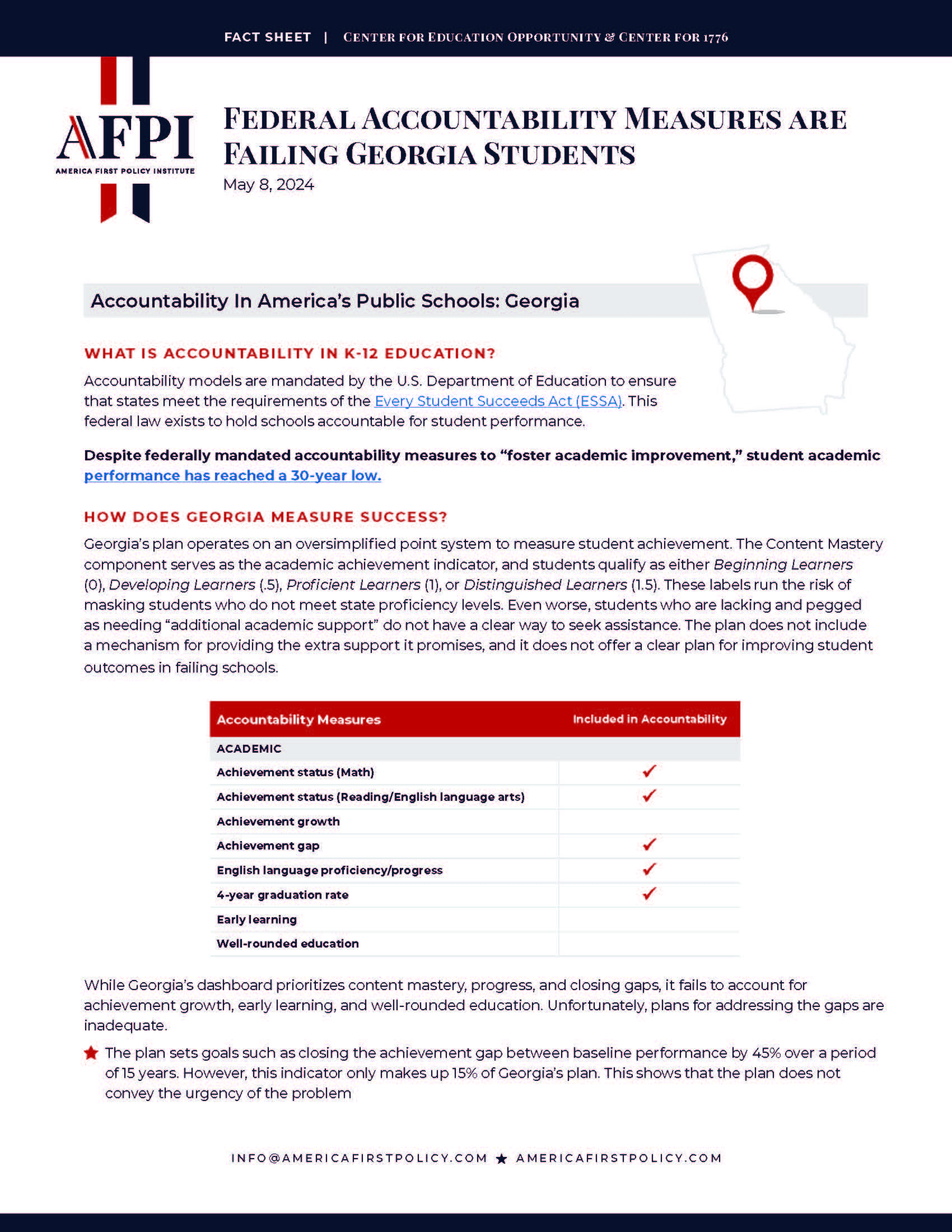Federal Accountability Measures are Failing Georgia Students
Accountability In America’s Public Schools: Georgia
WHAT IS ACCOUNTABILITY IN K-12 EDUCATION?
Accountability models are mandated by the U.S. Department of Education to ensure that states meet the requirements of the Every Student Succeeds Act (ESSA). This federal law exists to hold schools accountable for student performance.
Despite federally mandated accountability measures to “foster academic improvement,” student academic performance has reached a 30-year low.
HOW DOES GEORGIA MEASURE SUCCESS?
Georgia’s plan operates on an oversimplified point system to measure student achievement. The Content Mastery component serves as the academic achievement indicator, and students qualify as either Beginning Learners (0), Developing Learners (.5), Proficient Learners (1), or Distinguished Learners (1.5). These labels run the risk of masking students who do not meet state proficiency levels. Even worse, students who are lacking and pegged as needing “additional academic support” do not have a clear way to seek assistance. The plan does not include a mechanism for providing the extra support it promises, and it does not offer a clear plan for improving student outcomes in failing schools.
| Accountability Measures | Included in Accountability |
| ACADEMIC | |
| Achievement status (Math) | X |
| Achievement status (Reading/English language arts) | X |
| Achievement growth | |
| Achievement gap | X |
| English language proficiency/progress | X |
| 4-year graduation rate | X |
| Early learning | |
| Well-rounded education |
While Georgia’s dashboard prioritizes content mastery, progress, and closing gaps, it fails to account for achievement growth, early learning, and well-rounded education. Unfortunately, plans for addressing the gaps are inadequate.
- The plan sets goals such as closing the achievement gap between baseline performance by 45% over a period of 15 years. However, this indicator only makes up 15% of Georgia’s plan. This shows that the plan does not convey the urgency of the problem
THE NATIONAL ASSESSMENT OF EDUCATIONAL PROGRESS (NAEP), THE LARGEST NATIONAL ASSESSMENT, IS THE GOLD STANDARD FOR REPORTING OUR NATION’S EDUCATIONAL PROGRESS. WHAT DO THE LATEST NAEP RATINGS SHOW ABOUT THE EFFECTIVENESS OF GEORGIA’S ESSA PLAN?
In 2022, according to the National Assessment of Education Progress (NAEP) in Georgia:
The reading level of 4th grade students who performed at or above the NAEP Proficient in was only 39%.
Black 4th grade students had an average reading score that was 30 points lower than that for White students.
Hispanic 4th grade students had an average reading score that was 21 points lower than that for White students.
Low-income 4th grade students had an average reading score that was 23 points lower than that for students from middle and high income families.
RESTORING EDUCATION EXCELLENCE IN GEORGIA: TWO VITAL ACTIONS ARE NEEDED: HEIGHTENED TRANSPARENCY AND SHARPENED ACCOUNTABILITY.
Congress and states must reexamine their enforcement of federal accountability mandates for monitoring student performance, providing crucial data to assess the damage and guide effective interventions.
State assessment systems must modernize, and tests should reflect current curricula. Georgia’s model should deliver timely, actionable data regarding student progress and school performance to educators and parents.
Accountability measures should be designed and implemented at the state level. A one-size-fits-all federal accountability model is counterproductive.
To promote accountability and increase transparency, Georgia should:
- Increase parental involvement by upholding federal laws that ensure parents the right to observe the activities being performed in the classroom and access to any survey materials about their children (20 U.S.C. § 6318; 20 U.S.C § 1232h).
- Train elected school board members to review curriculum and ensure that students have access to evidence-based curricula that positively affect student outcomes over time.
- Install video cameras in classrooms to record class sessions, track student progress, monitor curriculum implementation, and increase safety.
- Abolish teacher tenure in K–12 education, which currently does not require proof or performance metrics, leading to lower rates of teacher performance.
